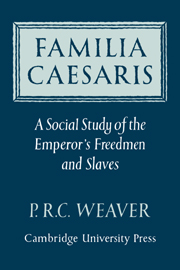Book contents
- Frontmatter
- Contents
- Preface
- Abbreviations
- INTRODUCTION
- PART I NOMENCLATURE AND CHRONOLOGY
- PART II THE FAMILY CIRCLE
- PART III THE EMPEROR'S SERVICE
- 12 Vicarii
- 13 Liberti servus and liberti libertus
- 14 ‘Vicariani’
- 15 The occupational hierarchy: some points of method
- 16 Sub-clerical grades
- 17 Adiutores: junior clerical grades
- 18 Intermediate clerical grades
- 19 Senior clerical grades
- 20 Senior administrative grades: a rationibus, ab epistulis, etc.
- 21 Freedman procurators
- 22 Imperial freedmen and equestrian status: the father of Claudius Etruscus
- CONCLUSION
- APPENDIXES
- Bibliography
- Index
18 - Intermediate clerical grades
Published online by Cambridge University Press: 07 October 2011
- Frontmatter
- Contents
- Preface
- Abbreviations
- INTRODUCTION
- PART I NOMENCLATURE AND CHRONOLOGY
- PART II THE FAMILY CIRCLE
- PART III THE EMPEROR'S SERVICE
- 12 Vicarii
- 13 Liberti servus and liberti libertus
- 14 ‘Vicariani’
- 15 The occupational hierarchy: some points of method
- 16 Sub-clerical grades
- 17 Adiutores: junior clerical grades
- 18 Intermediate clerical grades
- 19 Senior clerical grades
- 20 Senior administrative grades: a rationibus, ab epistulis, etc.
- 21 Freedman procurators
- 22 Imperial freedmen and equestrian status: the father of Claudius Etruscus
- CONCLUSION
- APPENDIXES
- Bibliography
- Index
Summary
The intermediate grades in the mixed slave–freedman clerical sequence are the freedman posts of tabularius and a commentariis. From within these grades there arose a range of higher posts, such as proximus tabulariorum and proximus commentariorum, which must also be considered.
The tabularius was the basic clerical post in a departmental office or tabularium. His functions were essentially those of accountant, involving the recording of payments made and those due, balancing the accounts of the department and communicating the results to the central bureau in Rome, whether the a rationibus itself or the ratio patrimonii. Much would depend on the sphere of operations of the particular department outside Rome, i.e. whether it was concerned with the revenue from a particular tax, overseeing the operations of conductores or direct supervision of patrimonial interests in a particular province or region. In the larger bureaux there must have been several officials assigned to these duties; hence further refinements in these clerical grades would have developed. Other duties were also involved, especially the drafting of documents, including receipts. A good example is in VI 10233 (dated 211) where Martialis Augg. lib. prox(imus) tab(ulariorum) records having received from P. Aelius Chrestus the proceeds of the sale of Imperial property negotiated by the equestrian procurator Agathonicus on behalf of the fiscus. The actual physical control of funds is the function of the dispensator, who sometimes is aided by an arcarius.
- Type
- Chapter
- Information
- Familia CaesarisA Social Study of the Emperor's Freedmen and Slaves, pp. 241 - 243Publisher: Cambridge University PressPrint publication year: 1972



